As the world is gripped by a pandemic, the role of finance leaders has never been of higher importance. Many CEOs, business founders, and employees will now look to finance leaders to guide the company through an unprecedented time. Many organizations have had to implement a crisis management plan at a drop of a hat, which means the priorities for finance leaders have now dramatically shifted. As the fears of a global recession intensify, here are five priorities to include in a crisis management plan.
1. Financial Analytics
In a climate that is currently so unpredictable and stock markets reaching historic lows, it isn’t a surprise that every senior finance leader wants in-depth financial analytics. Even before the coronavirus outbreak, real-time analytics were already in demand. Now to a PWC report, shows that 80% of senior finance are worried about a potential global recession. Their concerns also extend to consumer confidence and financial impact.
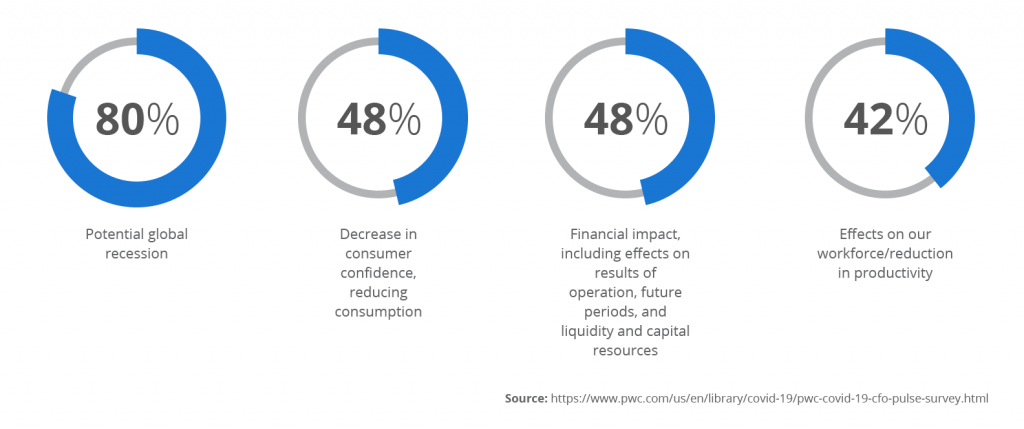
Crisis management plans need to include reporting tools as it can offer assurance and understanding into consumer actions, and the impact that lockdown has had on business over the coming weeks. It can offer them insight into where business sustainability can come from and identify areas of the expense within the organization. Reporting technology provides insight into cost savings, risk management, and compliance within the Procurement department. Want to know more about how technology can transform Procurement? Read this blog.
Automation ensures that you have in-depth reports on your Procurement and Accounts Payable departments to evaluate places to cut costs and make savings. You don’t have to trawl through paper or rely on staff figures to assess your current situation. Automation gives you accurate and detailed reports at your fingertips.
2. Remote Access
Remote access has become one of the biggest priorities for a CFO and the finance team. As organizations are enforcing remote working for employees’ safety, senior leaders are now being tasked with assessing current business costs, and are scrambling to identify what business functions are able to continue remotely to keep the company afloat.
Now, more than ever, their attention is on how to maintain productivity amongst their Procurement and Accounts Payable departments to keep their organization operating. In manual systems, employees can no longer access scanners and printers, leaving their invoice approval systems at a standstill. Even if senior management attempts to adapt their workloads and assign tasks to staff when they’re at home, they have extremely limited visibility into employees’ day-to-day. A Visual Capitalist survey reveals how much value you can add to an organization with strategic leadership.
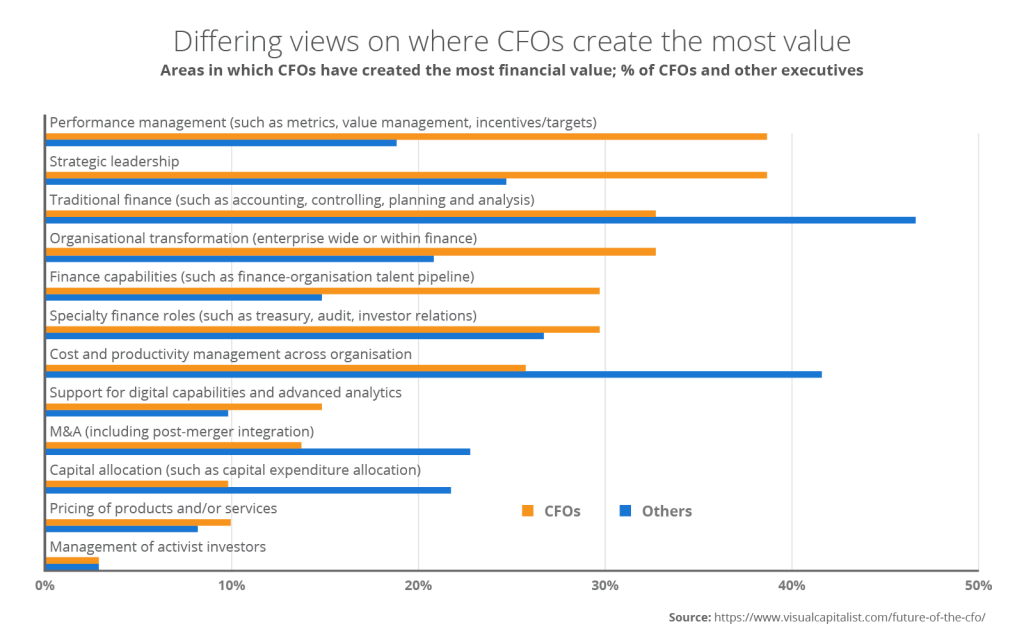
Companies who have implemented P2P automation are at a distinct advantage to continue business as usual. Even in crisis management mode, employees can log-on remotely and senior leaders can clearly track their daily workloads and productivity on one platform. Automation gives senior leaders the ability to strategically execute a plan and split high-value tasks up amongst their employees working remotely.
3. Reduce Costs
Before the outbreak of the coronavirus, CFOs were already certain that technology would be an area to harness in order to grow the business. According to TSC 2020 CFO study, 44% of CFOs reported that technology-enabled business model evolution would be to play a critical role in five years’ time.
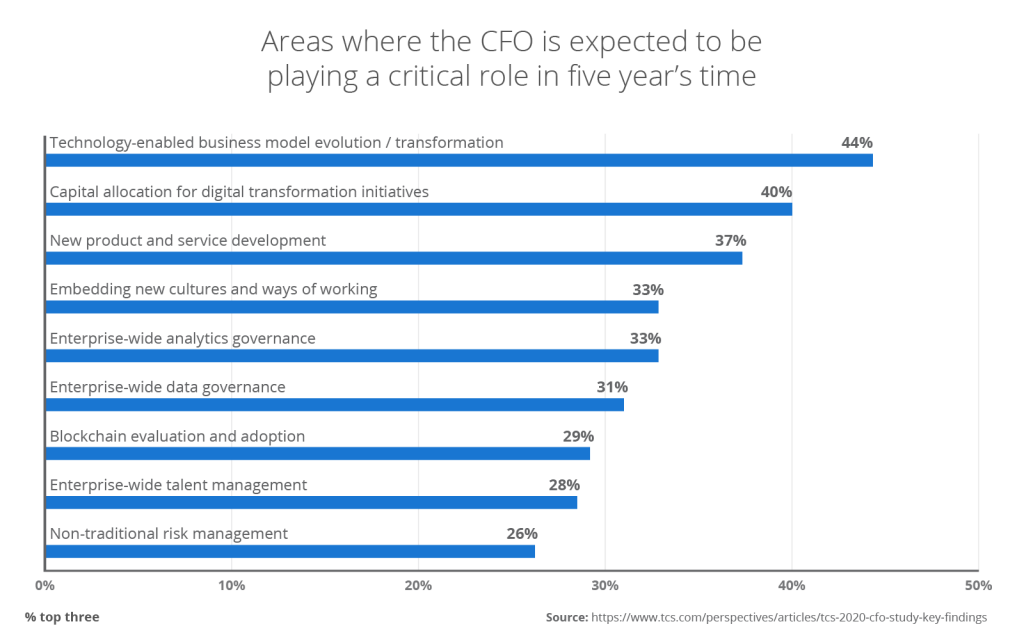
However, regardless of interest shown, most CFOs don’t have the time to commit to researching a solution, despite the clear benefits and how much technology could free up not only their employees’ workloads but their own too.
As crisis management looks set to ramp up, this is an opportunity to make time to look at the technology that will help your business stay afloat and get you successfully through these unstable times.
Cloud technology is one area that needs evaluation in crisis management. Why? Well as long as there is access to an Internet connection, employees can work anywhere at any time on any device with the cloud, meaning that working remotely isn’t a huge operation that delays and compromises project deadlines.
Furthermore, it takes the strain off of the IT department. In a manual process, the IT department are working around the clock to get employees set-up remotely. The cloud removes that requirement and employees can work from their kitchen table, collaborating effortlessly with almost real-time information which is safely and securely stored, removing the risk of USBs and time-consuming emailing back and forth to resolve an issue.
Now, more than ever, moving to this type of technology should be a priority for senior leaders as it saves the IT department significant expenses on hardware such as on-site servers, and the maintenance that comes with them. The cloud allows approval on the go using any device, including the SoftCo App, so no matter where anyone in your global company is staying safe, your operations are continuing.
Technology will also play a key role in the supply chain. It saves your employees time by removing tedious manual tasks and shifts the focus to keeping operations moving, which brings us to the next business priority in crisis management.
4. The Supply Chain
A spotlight has been put on suppliers and vendors throughout every industry to understand the impact the coronavirus will have on the supply chains. Technology that enables suppliers to submit invoices electronically has become critical, as staff are no longer in offices to handle paper. According to Science Alert, viruses can live on paper for up to four or five days. Furthermore, a PWC report shows that issues with the supply chain are already weighing on the minds of senior leaders.
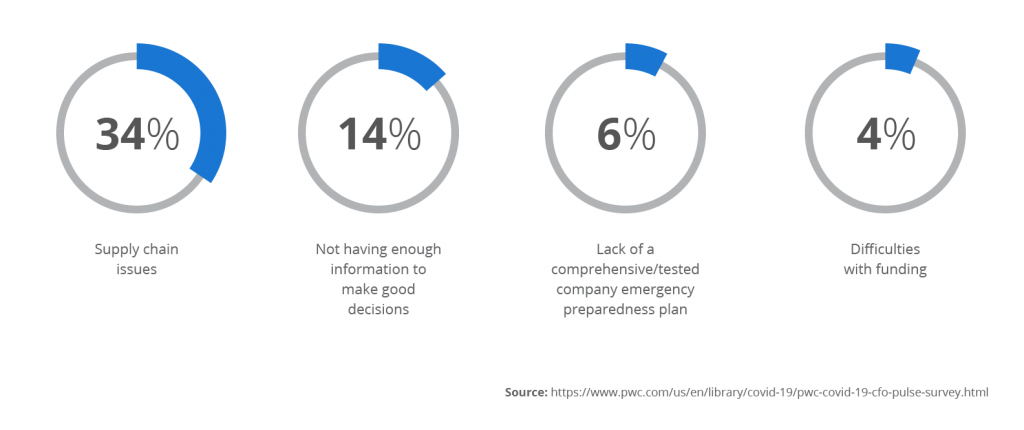
In light of this, senior leaders need to prioritize technology in their crisis management plan to keep the supply chain open and running. Vendor portals ensure that no one comes into contact with paper and the potential germs it could be spreading. It also reduces the number of calls employees take from concerned suppliers. When they log-in, they’ll have a complete view of their invoices, transactions, and statements. This eases the pressure on your staff, so they can focus on high-value tasks such as assessing supply chains and cash flow, to allow seniors to turn their attention to crucial contracts.
Contract Management will play a key role in crisis management. In a manual system, this requires senior management to trail through a whole heap of paper or huge excel files to get a clear picture of which contracts are up for renewal, payment deadlines and to determine termination penalties or force majeure clauses.
Not only is this time consuming but ensuring you remain compliant can be difficult. In fact, the biggest challenge that arises with Contract Management is usually the compliance element, whether that is government, legal or corporate regulations. A Levvel report showed that it was a concern for 61% of surveyed organizations. It was followed closely behind by data control and monitoring contract milestones and expiration dates.
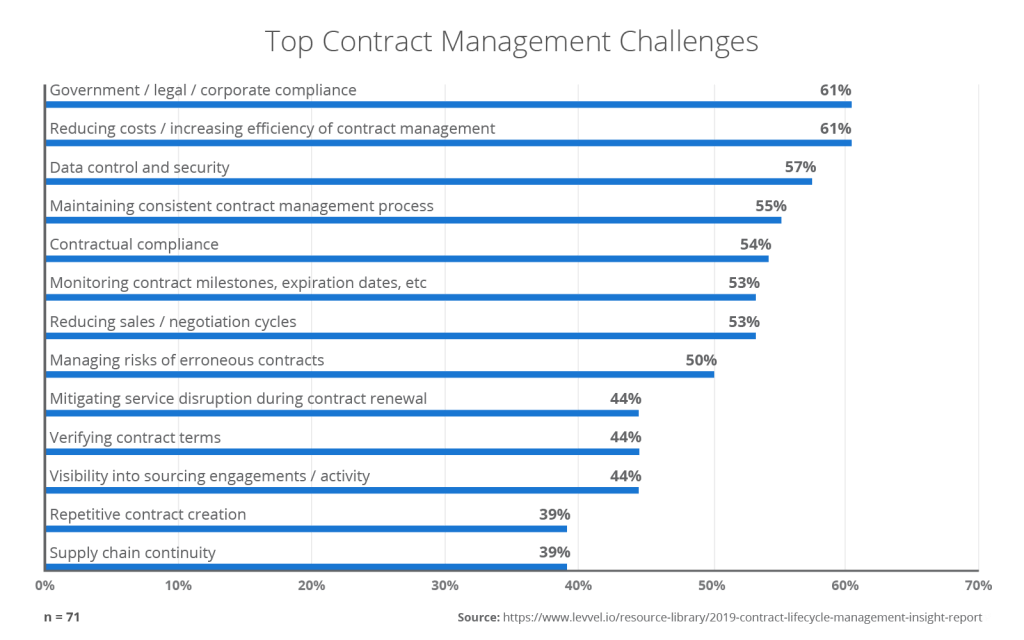
Senior leaders need to use modern technology tools to avoid falling into contract potholes and auto-renewals. A Contract Management module will alert you to the end of a contract, and if you do want to renew it, you can build a contract based on a previous one in a matter of minutes. This saves time and will make agreements a much swifter process, which is exactly what is needed in such an uncertain time. Moreover, it will provide management with the visibility to know what to prioritize and what can be removed to reduce costs and keep operations flowing smoothly.
5. Zone in on Talent
Crisis management usually includes cutting costs in the HR departments, which naturally means there are hiring freezes and layoffs in place for a large proportion of industries. Now, senior leaders must utilize and rely on the talent that they have in their current departments. Even before the outbreak, a study by Duke University found 44.2% of CFOs indicated an issue with finding talent to fill open positions.
Automation could address this issue, since, in a manual system, employees are consumed by low-level tasks such as data entry. Whereas those with automation will benefit from employees zoning in on high-value tasks.
Kelly Mahoney, the finance chief for Health Advances, did just that for the healthcare strategic consulting unit of Parexel. Explaining to Forbes, Mahoney said: “With our recent investments in infrastructure and people, our department has the opportunity to become a strategic business partner for the firm.” When employees feel empowered with high-valued tasks, morale is boosted and productivity soars.
This is particularly important in the current climate, as Deloitte has advised companies to turn their attention to collection processes and nailing the basics such as “timely and accurate invoicing.” There’s no room for human error that occurs in manual processes, as any mistakes in the billing process will lead to delays in receiving payments. Automating AP and Procurement is an area of crisis management that will play an important role, as it means you get the basics right and it frees up employees to become strategic to identify areas of sustainability within departments and which budgets can be pulled tighter.
Conclusion
In a time when crisis management is in full swing, getting the basics perfect, keeping supply chains open, safe and free from paper, whilst communicating with vendors and suppliers is vital to operations. Using technology to automate systems will give you and your staff the flexibility to ensure the low-level tasks are being performed, but most of the attention is set aside to take a look at reports and analysis of where sustainability should come from. Contract Management software will bring much-needed organization and visibility, but you need to take the time to invest in technology such as the cloud and automation to ensure remote working will be an easy and smooth transition from office to home. After all, no one really has an end date to the coronavirus and it could be months before normal office life returns. However, there is a shining glimmer of hope shared amongst the community, in the PWC report, 66% believe it will only take a month for their business to bounce back.


